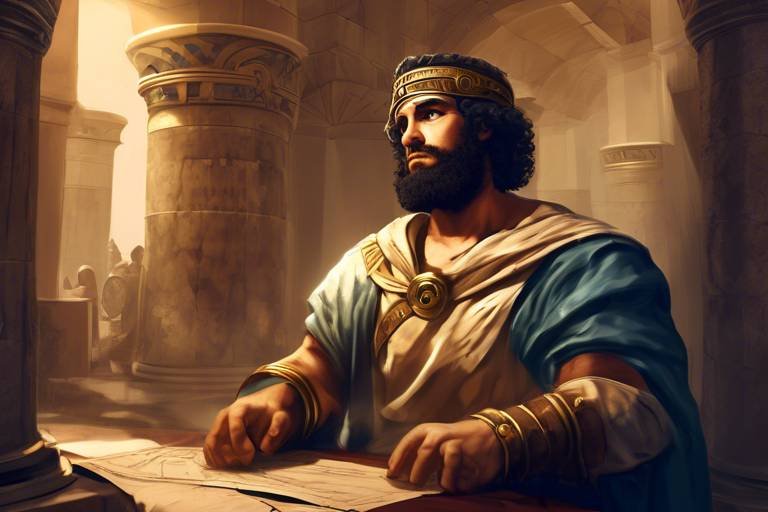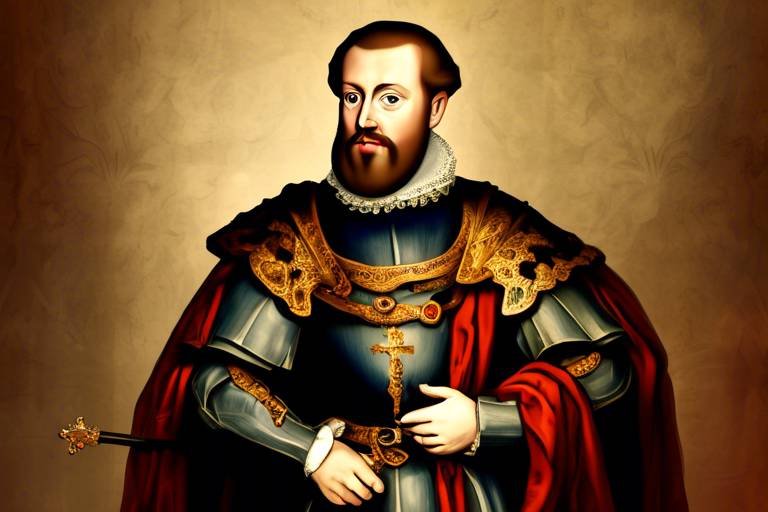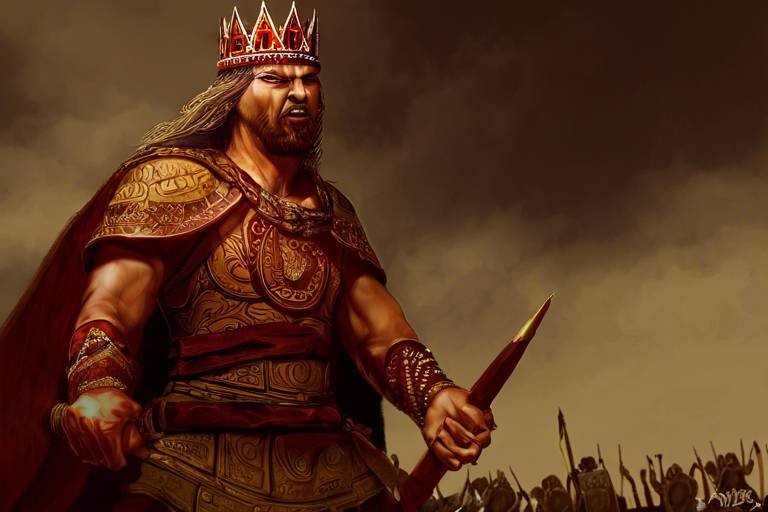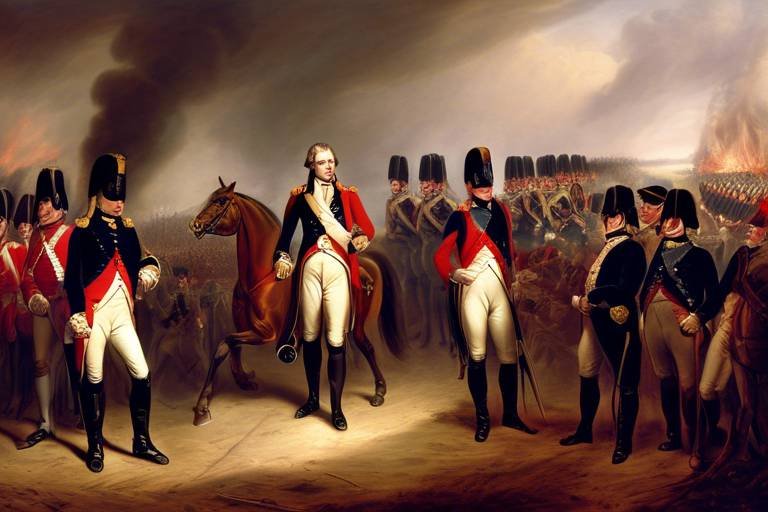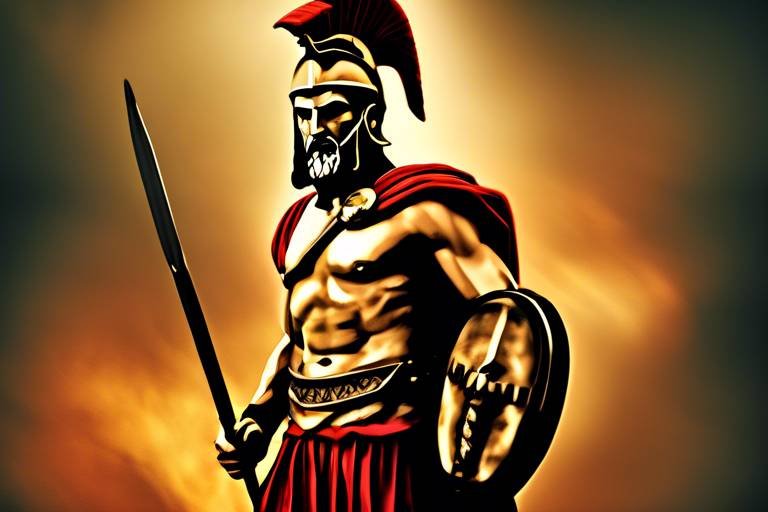Saladin: The Unifier of Islam
Saladin, also known as Salah ad-Din Yusuf ibn Ayyub, stands as a towering figure in Islamic history, revered for his remarkable leadership and unifying efforts during the medieval era. Born in Tikrit, Iraq, in 1137, Saladin's early life was marked by a blend of military training and scholarly pursuits, shaping him into a multifaceted leader with a deep understanding of both warfare and diplomacy.
One of the most pivotal moments in Saladin's legacy was the conquest of Jerusalem in 1187. This event not only demonstrated his military prowess but also solidified his position as a unifier of various factions within Islam. The capture of Jerusalem from the Crusaders had a profound impact on the Muslim world, sparking a wave of enthusiasm and unity among believers.
When it comes to battle tactics and strategies, Saladin was known for his innovative approaches that often outmaneuvered his opponents. His ability to adapt to changing circumstances and leverage the terrain to his advantage set him apart as a formidable military leader. Whether facing the Crusaders or internal rivals, Saladin's strategic acumen was a key factor in his success on the battlefield.
Aside from his military achievements, Saladin's political acumen played a crucial role in unifying the Muslim territories under his rule. Through a combination of diplomacy and force, he established a centralized government that brought stability and prosperity to the region. His ability to navigate complex political landscapes and forge alliances with various factions showcased his skill as a statesman.
Saladin's cultural and religious influence extended beyond the battlefield, as he actively promoted Islamic values and supported artistic endeavors. His patronage of scholars, poets, and architects contributed to the flourishing of Islamic culture during his reign, leaving a lasting impact on the arts and architecture of the time.
As we reflect on Saladin's legacy and historical impact, it becomes evident that his role as a unifier of Islam transcends his lifetime. His legacy continues to inspire leaders across the world, serving as a testament to the power of unity and leadership in times of adversity. Saladin's ability to bring together diverse factions under a common cause remains a timeless example of effective leadership.
When comparing Saladin to other historical figures who played similar unifying roles, parallels can be drawn with leaders like Alexander the Great and Genghis Khan. Each of these figures, in their own way, demonstrated the ability to unite disparate groups and forge powerful empires through their leadership and vision.
- 1. What was Saladin's most significant military achievement?
- 2. How did Saladin's conquest of Jerusalem impact the Muslim world?
- 3. What were some of Saladin's diplomatic strategies in dealing with rival factions?
- 4. How did Saladin contribute to the cultural and artistic development of the Islamic world?
- 5. What is Saladin's enduring legacy in modern times?

Early Life and Background
Saladin, a legendary figure in Islamic history, is celebrated for his remarkable leadership and unification of various factions within Islam during the medieval era. His enduring legacy as a military commander, diplomat, and statesman continues to inspire generations.
Saladin, originally named Salah ad-Din Yusuf ibn Ayyub, was born in Tikrit, Iraq, in 1137. Raised in a Sunni Muslim family, he received a diverse education that included studies in theology, law, and military tactics. His early exposure to different disciplines laid the foundation for his future endeavors as a leader.
As a young man, Saladin joined the army of his uncle Shirkuh, a prominent military commander, and quickly rose through the ranks due to his strategic acumen and bravery on the battlefield. His experiences in warfare and governance in the tumultuous political landscape of the Middle East shaped his character and leadership qualities.
Saladin's background as a Kurd in a predominantly Arab society provided him with a unique perspective on the complexities of regional politics and power dynamics. This diverse heritage influenced his inclusive approach to governance and his ability to bridge cultural divides within the Islamic world.

Conquest of Jerusalem
Exploring the life and legacy of Saladin, the renowned Muslim leader who unified various factions within Islam and fought against the Crusaders during the medieval era.
Saladin's conquest of Jerusalem in 1187 marked a significant turning point in the history of the region. The capture of this holy city had a profound impact on the Muslim world, reshaping the balance of power in the ongoing conflict with the Crusaders.
Saladin's military campaign leading to the conquest of Jerusalem showcased his strategic brilliance and tactical prowess. Through a combination of siege warfare, skilled diplomacy, and unity among Muslim forces, Saladin successfully reclaimed the city from the Crusaders, demonstrating his leadership abilities on the battlefield.
The fall of Jerusalem to Saladin not only secured a major victory for the Muslim forces but also solidified his reputation as a formidable military commander. The conquest of this revered city resonated throughout the Islamic world, inspiring hope and unity among Muslims in the face of external threats.
Saladin's capture of Jerusalem was not merely a military triumph but also a cultural and religious milestone. His respect for the city's diverse religious communities and commitment to preserving its sacred sites earned him admiration even among his adversaries. Saladin's magnanimity in victory set a precedent for tolerance and coexistence in the region, fostering a spirit of mutual respect among different faiths.
The legacy of Saladin's conquest of Jerusalem endures to this day, symbolizing the resilience and determination of the Muslim world in the face of adversity. His ability to unite disparate factions under a common cause and achieve a monumental victory against the Crusaders solidified his reputation as a unifying figure in Islamic history.

Battle Tactics and Strategies
Saladin, known for his strategic brilliance on the battlefield, employed a variety of tactics and strategies that set him apart as a military leader. One of his key strengths lay in his ability to adapt to different terrains and situations, making him a formidable opponent against the Crusaders. Instead of relying solely on brute force, Saladin often utilized a combination of psychological warfare, intelligence gathering, and swift maneuvers to outmaneuver his enemies.
One of Saladin's most famous tactics was his use of feigned retreats to lure the Crusaders into a false sense of security before launching a counterattack. This deceptive maneuver allowed him to exploit the overconfidence of his adversaries and inflict heavy losses on their forces. By carefully studying his opponents and exploiting their weaknesses, Saladin was able to turn the tide of battle in his favor time and time again.
Furthermore, Saladin was a master of siege warfare, employing innovative techniques to breach fortified cities and strongholds. His meticulous planning and patience during sieges often paid off, leading to the successful capture of key strategic locations. By combining traditional siege methods with unconventional tactics, Saladin was able to overcome seemingly insurmountable defenses and emerge victorious in many critical battles.
Moreover, Saladin's emphasis on unity and discipline among his troops was crucial to his success on the battlefield. By fostering a sense of camaraderie and loyalty among his soldiers, he was able to maintain a cohesive and efficient fighting force that could withstand the rigors of prolonged campaigns. This sense of solidarity and shared purpose instilled by Saladin among his troops gave them the resilience and determination needed to face even the most formidable foes.
In conclusion, Saladin's innovative battle tactics and strategic acumen were instrumental in his military achievements against the Crusaders and other adversaries. His ability to blend traditional warfare with unconventional strategies, coupled with his emphasis on unity and discipline, solidified his reputation as one of the greatest military minds in history.

Political Achievements
Saladin's political achievements were as remarkable as his military prowess. Beyond his battlefield triumphs, he displayed exceptional acumen in consolidating power and governance over the vast Muslim territories he controlled. One of his key political achievements was the establishment of a strong, centralized rule that brought stability and cohesion to the region. Through his adept leadership, Saladin successfully unified various factions within Islam, fostering a sense of common purpose and identity among diverse groups.
In addition to his internal consolidation efforts, Saladin also demonstrated remarkable diplomatic skills in managing relationships with neighboring states and foreign powers. By forging strategic alliances and negotiating treaties, he effectively secured his position and safeguarded the interests of his realm. These diplomatic maneuvers not only enhanced Saladin's political standing but also contributed to the overall peace and prosperity of the region.
Furthermore, Saladin's administration was marked by a commitment to justice and fairness, earning him respect and admiration from both his subjects and adversaries. His governance was characterized by a balance of firmness and benevolence, ensuring that law and order prevailed while also fostering a sense of social harmony. Saladin's political achievements extended beyond mere conquests; they encompassed the establishment of a just and equitable society under his rule.

Diplomatic Relations
Saladin's diplomatic finesse was a cornerstone of his success in uniting the diverse factions within the Islamic world. Through strategic alliances and skilled negotiation, Saladin solidified his position as a respected leader among both his allies and adversaries. His ability to navigate complex political landscapes and forge alliances with various factions enabled him to consolidate his power and influence across the region.
One of Saladin's most notable diplomatic achievements was his collaboration with other Muslim leaders, such as the caliph of Baghdad and the rulers of various Islamic emirates. By fostering strong relationships with these key figures, Saladin was able to garner support for his military campaigns and maintain stability within the territories under his control. This network of alliances not only strengthened Saladin's military might but also bolstered his political legitimacy as a unifying force in the Islamic world.
Furthermore, Saladin's diplomatic acumen extended beyond the Muslim community to encompass interactions with non-Muslim powers, including European monarchs and Crusader states. Despite being engaged in conflict with the Crusaders, Saladin recognized the importance of diplomacy in managing relations with his Christian adversaries. Through diplomatic channels, Saladin negotiated truces, prisoner exchanges, and trade agreements, demonstrating his pragmatic approach to international relations.
Saladin's diplomatic efforts were characterized by a balance of coercion and conciliation, where he utilized both military strength and negotiation skills to achieve his political objectives. By leveraging his reputation as a formidable military commander and a shrewd diplomat, Saladin was able to navigate the complex web of alliances and rivalries in the medieval Middle East, earning him the respect and admiration of his contemporaries.

Cultural and Religious Influence
Saladin, the legendary Muslim leader, is celebrated for his remarkable achievements in unifying various factions within Islam and leading the charge against the Crusaders during the medieval era. His life and legacy continue to inspire admiration and respect among historians and scholars alike.
Saladin's upbringing played a crucial role in shaping his character and leadership qualities. Born into a prominent Kurdish family in Tikrit, Iraq, Saladin was exposed to diverse cultural influences from a young age. His education in the arts, sciences, and military strategies laid the foundation for his future successes as a military and political leader.
In 1187, Saladin achieved a monumental victory by capturing Jerusalem from the Crusaders, a momentous event that reverberated throughout the Muslim world. The fall of Jerusalem marked a turning point in the conflict between the Muslim and Christian forces, solidifying Saladin's reputation as a formidable military commander.
Saladin's military campaigns were marked by strategic brilliance and innovative tactics that outmaneuvered his adversaries. His emphasis on swift cavalry attacks, combined with psychological warfare, allowed him to secure key victories against the Crusaders and expand his influence across the region.
Saladin's political acumen was instrumental in uniting the fragmented Muslim territories under a centralized rule. Through skillful diplomacy and alliances with various factions, Saladin established a stable governance structure that laid the groundwork for a flourishing Islamic empire.
Saladin's diplomatic finesse enabled him to forge alliances with diverse groups, including rival factions and foreign powers, to bolster his position and maintain peace within his realm. His ability to navigate complex political landscapes earned him respect and admiration from both allies and adversaries.
Saladin's influence extended beyond the battlefield, as he actively promoted Islamic culture and values throughout his realm. His patronage of the arts and architecture led to a flourishing of cultural achievements, with mosques, palaces, and educational institutions flourishing under his rule. Saladin's commitment to religious tolerance and respect for diverse faiths set a precedent for harmonious coexistence in the region.
Saladin's enduring legacy as a unifier of Islam continues to resonate in the annals of history, inspiring subsequent generations of leaders to emulate his example. His contributions to the political, military, and cultural spheres have left an indelible mark on the Muslim world and beyond, solidifying his place as one of the greatest figures in Islamic history.
When comparing Saladin to other prominent historical figures who played similar unifying roles in their societies, parallels can be drawn with leaders such as Alexander the Great, Charlemagne, and Genghis Khan. Like these illustrious figures, Saladin's legacy transcends his era, leaving a lasting impact on the course of history.

Legacy and Historical Impact
Saladin's legacy as a unifier of Islam and his historical impact reverberate through the annals of time, leaving a profound mark on the Muslim world and beyond. His strategic prowess and unwavering dedication to the cause of Islam have solidified his position as one of the most revered figures in history.
One of the most significant aspects of Saladin's legacy is his role in reclaiming Jerusalem from the Crusaders in 1187. This monumental victory not only unified the Muslim territories under his rule but also dealt a severe blow to the Crusader states, reshaping the geopolitical landscape of the region.
Saladin's military campaigns and diplomatic finesse have set a benchmark for leadership and statesmanship. His ability to forge alliances with diverse factions while maintaining the integrity of his rule showcases his diplomatic acumen and strategic vision.
Furthermore, Saladin's commitment to promoting Islamic culture and values has left an indelible mark on the artistic and architectural landscape of the Muslim world. His patronage of scholars, artists, and architects has contributed to the flourishing of Islamic arts and sciences during his reign.
The historical impact of Saladin extends far beyond his lifetime, inspiring generations of leaders to emulate his example of unity, tolerance, and leadership. His legacy serves as a beacon of hope and inspiration for those seeking to bridge divides and foster harmony in a diverse and complex world.

Comparison with Other Historical Figures
When comparing Saladin with other historical figures who played similar unifying roles in their societies, it becomes evident that he stands out as a remarkable leader with exceptional qualities. One such figure is Alexander the Great, known for his military conquests and efforts to blend cultures in his vast empire. While Alexander focused on expanding his empire through military might, Saladin emphasized unity among the Muslim factions and sought to establish a stable and cohesive Islamic state.
Another historical figure often compared to Saladin is Emperor Ashoka of the Maurya Empire. Ashoka, like Saladin, promoted peace and religious tolerance within his realm, implementing policies that aimed to unify his diverse subjects. However, Saladin's unification efforts were primarily centered around Islam and the consolidation of Muslim territories, whereas Ashoka's approach encompassed a broader spectrum of religions and cultures.
Furthermore, the comparison can be drawn with Queen Elizabeth I of England, known for her diplomatic skills and ability to navigate complex political landscapes. While Elizabeth focused on maintaining stability within her realm and balancing power dynamics in Europe, Saladin's diplomatic efforts were geared towards forging alliances within the Muslim world and countering external threats, particularly from the Crusaders.
In essence, while each of these historical figures exhibited unique strengths and strategies in their quest for unification, Saladin's legacy as the unifier of Islam remains unparalleled in its impact on the Muslim world and beyond.
Frequently Asked Questions
- Who was Saladin?
Saladin, also known as Salah ad-Din, was a prominent Muslim leader during the medieval era who rose to power in the 12th century. He is renowned for his role in unifying various factions within Islam and leading successful campaigns against the Crusaders.
- What were Saladin's major accomplishments?
Saladin's major accomplishments include the conquest of Jerusalem in 1187, his political prowess in unifying Muslim territories, and his diplomatic skills in forming alliances to strengthen his rule. He also made significant contributions to Islamic culture and architecture.
- How did Saladin impact history?
Saladin's legacy as a unifier of Islam and his military successes against the Crusaders left a lasting impact on history. His leadership qualities, military strategies, and diplomatic acumen continue to be studied and admired by scholars and leaders around the world.



